Sign My Name to Freedom: The Unheard Songs of Betty Reid Soskin
Michael Gene Sullivan (Book); Betty Reid Soskin (Lyrics); Betty Reid Soskin, Daniel Sovio & Others (Music)
Concept by Jamie Zimmer
Based on the Life, Music & Writing of Betty Reid Soskin
San Francisco Bay Area Theatre Company (SFBATCO)

There are times when seeing a live, theatre production is nothing short of a blessed event in one’s life – a time when a story and its telling is so profound that one knows that the moments in that arena with those actors will never be forgotten.
Such was my feeling after witnessing the near one hundred years of Betty Reid Soskin’s life pass before us in SFBATCO’s captivating, uplifting, and energizing world premiere of Sign My Name to Freedom by Michael Gene Sullivan (book). Peppered with songs written by Soskin during her lifetime, Sign My Name to Freedom is a joyful and eye-opening testament not only to the incredible, wide-range personal and political accomplishments of one woman of mixed Creole and Black heritage but also to a history too long untold of the struggles, the injustices against, and the sheer courage and determination to survive and succeed of so many others like her. Sign My Name to Freedom: The Unheard Songs of Betty Reid Soskin is San Francisco Bay Area Theatre Company’s must-see gift to the same Bay Area where the songwriter, author, activist, entrepreneur, and finally nation’s oldest park ranger has spent the bulk of her now 102 years.
Based on the concept by Jamie Zimmer and on the writings by Betty Reid Soskin (including her 2018 memoir by the musical’s same title), Michael Gene Sullivan has cleverly taken Soskin’s rich trove of information and ideas and penned her story using four Bettys representing different periods of her life that range in age from a girl less than ten to a woman of ninety-five. Each brings a perspective unique and enlightening as memories spill out of a life where personal and historical challenges, tragedies, and celebrations intermingle. As the elder Betty’s memories unfold before us as four persona, they often interact, sometimes clash, and in the end, embrace each other’s perspectives and experiences. The four-voiced approach taken by the playwright and enhanced by the deft, sensitive, and often dashing direction of Elizabeth Carter result in a life story multi-faceted, fascinating, and inspiring.
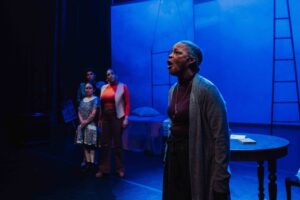 We first meet the ninety-five-year-old Betty in her Richmond, California apartment as she is being robbed in the middle of the night – an upsetting event but one that after the awakened Betty punches the masked man in the crotch, she defiantly declares to her best friend, Renee (a delightful Jasmine Milan Williams), “It’ll take more than a skinny, white boy to do me in after 95 years.” Cathleen Riddley is no less than stunning as the elder Betty, bringing a resilient determination marked with a spirit that permeates with spark and spunk. As she occasionally sings the songs whose lyrics were written throughout the life by the real Betty, Cathleen Riddley intones rich, clear, sure-footed notes that bear witness to the full, well-lived life of Betty.
We first meet the ninety-five-year-old Betty in her Richmond, California apartment as she is being robbed in the middle of the night – an upsetting event but one that after the awakened Betty punches the masked man in the crotch, she defiantly declares to her best friend, Renee (a delightful Jasmine Milan Williams), “It’ll take more than a skinny, white boy to do me in after 95 years.” Cathleen Riddley is no less than stunning as the elder Betty, bringing a resilient determination marked with a spirit that permeates with spark and spunk. As she occasionally sings the songs whose lyrics were written throughout the life by the real Betty, Cathleen Riddley intones rich, clear, sure-footed notes that bear witness to the full, well-lived life of Betty.
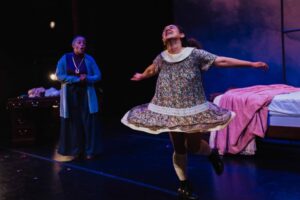 The eldest Betty is soon joined by the youngest – a rambunctious, bursting with energy and curiosity “Little Betty” who is prone to raise her girlish skirt as she twirls, jump on the bed one moment and pout under its sheets the next, and always to chime in with fascination and questions about the life she sees through the other Bettys that is coming up for her in later years. Tierra Allen has no trouble convincing us that she is somewhere between six and ten but also oft with the observation and wisdom of someone several decades older. Her Little Betty sings with the full heart and enthusiasm of a youngster and with a voice that also booms forth with big-stage abilities. She is hilarious as she tries to keep track of the changes in how the Bettys describe their heritage, tracing names given them through the years by the majority society from Creole to Negro to colored to Black to African American.
The eldest Betty is soon joined by the youngest – a rambunctious, bursting with energy and curiosity “Little Betty” who is prone to raise her girlish skirt as she twirls, jump on the bed one moment and pout under its sheets the next, and always to chime in with fascination and questions about the life she sees through the other Bettys that is coming up for her in later years. Tierra Allen has no trouble convincing us that she is somewhere between six and ten but also oft with the observation and wisdom of someone several decades older. Her Little Betty sings with the full heart and enthusiasm of a youngster and with a voice that also booms forth with big-stage abilities. She is hilarious as she tries to keep track of the changes in how the Bettys describe their heritage, tracing names given them through the years by the majority society from Creole to Negro to colored to Black to African American.
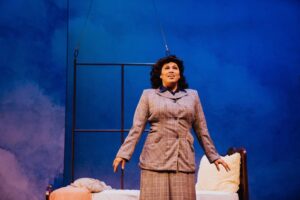 When the Betty and Little Betty’s related memories converge on a handsome, muscled boy they elongate in name to “Mellll-vin,” a smartly dressed, somewhat cautious and conservative “Married Betty” joins them. Aidaa Peerzada marvels us with sultry, bluesy notes that sway and swing as she sings of her husband-to-be, “Where is my brown-skinned heart?” Married Betty arrives in the 1940s, war-time job market and gives us a glimpse of the hit-the-streets, speak-from-the-podium Bettys to follow when she tells a white, condescending supervisor who tells her that white women will not accept Betty’s deserved promotion to supervise them, “Take you pen and shove it up your ass.”
When the Betty and Little Betty’s related memories converge on a handsome, muscled boy they elongate in name to “Mellll-vin,” a smartly dressed, somewhat cautious and conservative “Married Betty” joins them. Aidaa Peerzada marvels us with sultry, bluesy notes that sway and swing as she sings of her husband-to-be, “Where is my brown-skinned heart?” Married Betty arrives in the 1940s, war-time job market and gives us a glimpse of the hit-the-streets, speak-from-the-podium Bettys to follow when she tells a white, condescending supervisor who tells her that white women will not accept Betty’s deserved promotion to supervise them, “Take you pen and shove it up your ass.”
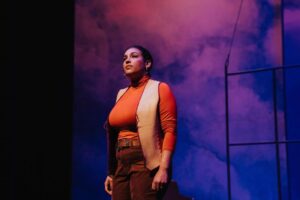
But Married Betty soon has four children and the responsibility of helping her husband run their very successful record store in Oakland. A move to the very white, discriminatory Walnut Creek where the local school is holding a fund raiser by putting on a whites-in-black-face minstrel show soon leads to the emergence of “Revolutionary Betty,” with Lucca Troutman arriving in 1960s garb and guitar in hand. With Married Betty, this protest-ready Betty sings, “The sun sings my song … The day of my dawning is now” in an arousing, anthem-like “A Woman Am I.” Her Betty heads wherever injustice shows its face and needs to be confronted – be it at peace rallies, to support the Black Panther movement, or to head to the 1972 Democratic Convention. With the original Betty, Revolutionary Betty sings with full voice in the style reminiscent of major 60s’civil-rights and anti-war protests, “Ain’t no turning back now, I signed my name to freedom.”
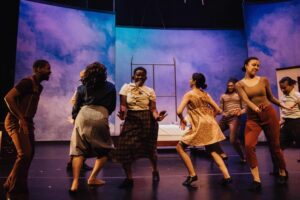
Greatly augmenting the vivacity of the evening is the frequent appearance of an excellent ensemble of actors/dancers (Jeremy Brooks, Marc Cunanan Chappelle, Markaila Dyson, and Ahja Henry) that play a wide variety of parts from medical staff to nightclub revelers to war protestors and more. Choreography designed by laura elaine ellis explodes on the stage when a combination of the 1940’s lindy hop, jive, swing, and jitterbug send couples into high kicks, twirls, splits, and gyrating moves galore as they reenact a Black USO club founded by Betty and Melvin because the WWII white USO did not allow Black service men to enter (except to serve drinks as waiters).

Particularly wowing and emotionally powerful are the aerial performances on a rotating window frame and a swirling ladder by dancers William Brewton Fowler, Jr., Nina Sawant, and Veronica Blair as they portray the power of a devastating hurricane and the horrible tragedy of an ammunition supply depot’s explosion – just two of a number of monumental historical events which intersect and shape Betty’s century-plus of living.
Mikko Uesugi has created an effective set design allowing seamless scene transitions as the Bettys’ lives progress. The lighting designed by Claudio Andres Silva Restrepo not only provides scenes’ focus and mood but also creates larger than life, profiled silhouettes to add much drama to key scenes. Jules Indelicato’s sound design has ensured not one word of sung or spoken line is lost as well as to provide aural context to the passing eras of Betty’s long life. Those many decades birth an array of clothing designs, all beautifully brought back to life by Tiersa Nureyev.
From the evening’s exhilarating overture that sends toes tapping one moment and shoulders romantically swaying the next, to the music accompanying singers and scenes throughout, music director, band conductor, and keyboardist Daniel Savio; drummer Jason Young; bass player Guinevere Q; and multiple instrumentalist Breakfast reign supreme. I had to look at my program several times to believe that only four musicians were playing all the big-band music emanating from the hidden stage above.
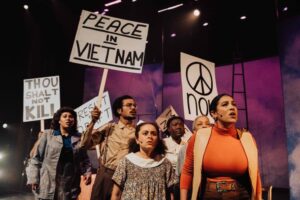
In the end, experiencing Betty Reid Soskin’s life as told by her through her lyrics and Michael Gene Sullivan’s script is like having enrolled in a class on twentieth-century history – a history that white-written textbooks and teachers have long overlooked. But Betty has the remedy for such neglect and oversight that she has clearly followed all of her 102 years (and counting): “Who tells history depends on who’s in the room, and you just have to fight to be in there.”
And let us all say, “Amen.”
Rating: 5 E, MUST-SEE
A Theatre Eddys Best Bet Production
Sign My Name to Freedom: The Unheard Songs of Betty Reid Soskin continues through April 13, 2024 in a two-hour, thirty-minute (one intermission), world premiere production by San Francisco Bay Area Theatre Company (SFBATCO) at Z Space, 450 Florida Street, San Francisco. Tickets are available online at www.zspace.org or at https://www.sfbatco.org , by phone at 415-626-0453, or by email at boxoffice@zspace.org.
Photo Credits: SFBATCO

Leave a Reply